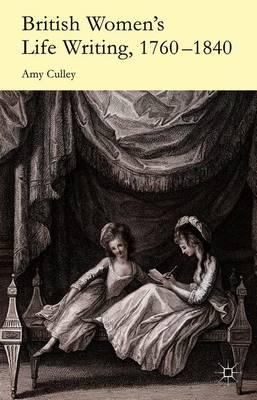Overview
British Women's Life Writing, 1760-1840 brings together for the first time a wide range of print and manuscript sources to demonstrate women's innovative approach to self-representation. It examines canonical writers, such as Mary Wollstonecraft, Mary Robinson, and Helen Maria Williams, amongst others.
Full Product Details
Author: A. Culley
Publisher: Palgrave Macmillan
Imprint: Palgrave Macmillan
Dimensions:
Width: 14.00cm
, Height: 1.50cm
, Length: 21.60cm
Weight: 4.532kg
ISBN: 9781137274212
ISBN 10: 1137274212
Pages: 270
Publication Date: 22 July 2014
Audience:
Professional and scholarly
,
Professional & Vocational
Format: Hardback
Publisher's Status: Active
Availability: In Print

This item will be ordered in for you from one of our suppliers. Upon receipt, we will promptly dispatch it out to you. For in store availability, please contact us.
Reviews
This book productively deploys the more capacious conceptual model of life-writing to take account of the diverse ways in which women narrated their lives, through print and manuscript, emphasising themes of community, textual sociability and generational interaction. There is no book that applies the methodology of 'life- writing studies' to 18th and 19th century women in this way. The book has a number of interdisciplinary strengths, appealing to scholars in history, gender studies, literary studies, French Revolution studies, celebrity studies and life writing studies. - Elizabeth Eger, Kings College London, UK Life writing has fresh theory, which Culley uses thoughtfully and imaginatively in tandem with scholarship on 18th-century lives, letters, journals and travel writing... With all its case studies, the book makes a convincing case for seeing women's life writing as outward-looking, even if its insistence on relationality raises an unfashionable question: did none of these women ever shut the door and breathe a sigh of relief that on paper they could be or invent themselves? The egalitarianism of life writing has been very beneficial to literary studies, and Culley's sympathetic readings show how. I wonder, though, whether the updating of models of relationships from circles to social networks projects our own remodelling of relationships in social media: this is the LinkedIn version of self. No wonder it's persuasive. - Clare Brant, Times Higher Education A carefully constructed and warm-hearted study... Culley believes the women she has studied were intending something very different: creating a communal memory, a collective history, blurring genres of biography and autobiography and of aural record and literary text. For them, life writing was not about individual expression, but the recording of communal experience for the benefit of posterity. - Kate Chisholm, Times Literary Supplement
This book productively deploys the more capacious conceptual model of life-writing to take account of the diverse ways in which women narrated their lives, through print and manuscript, emphasising themes of community, textual sociability and generational interaction. There is no book that applies the methodology of 'life- writing studies' to 18th and 19th century women in this way. The book has a number of interdisciplinary strengths, appealing to scholars in history, gender studies, literary studies, French Revolution studies, celebrity studies and life writing studies. - Elizabeth Eger, Kings College London, UK Life writing has fresh theory, which Culley uses thoughtfully and imaginatively in tandem with scholarship on 18th-century lives, letters, journals and travel writing... With all its case studies, the book makes a convincing case for seeing women's life writing as outward-looking, even if its insistence on relationality raises an unfashionable question: did none of these women ever shut the door and breathe a sigh of relief that on paper they could be or invent themselves? The egalitarianism of life writing has been very beneficial to literary studies, and Culley's sympathetic readings show how. I wonder, though, whether the updating of models of relationships from circles to social networks projects our own remodelling of relationships in social media: this is the LinkedIn version of self. No wonder it's persuasive. - Clare Brant, Times Higher Education
'This book productively deploys the more capacious conceptual model of life-writing to take account of the diverse ways in which women narrated their lives, through print and manuscript, emphasising themes of community, textual sociability and generational interaction. There is no book that applies the methodology of 'life- writing studies' to 18th and 19th century women in this way. The book has a number of interdisciplinary strengths, appealing to scholars in history, gender studies, literary studies, French Revolution studies, celebrity studies and life writing studies.' - Elizabeth Eger, Kings College London, UK
Author Information
Amy Culley is a Senior Lecturer in English at the University of Lincoln, UK. She has published essays on women's life writing in the eighteenth century and Romantic period. She is the editor of volumes 1-4 of Women's Court and Society Memoirs (2009) and co-editor of Women's Life Writing, 1700-1850: Gender, Genre and Authorship (2012).




